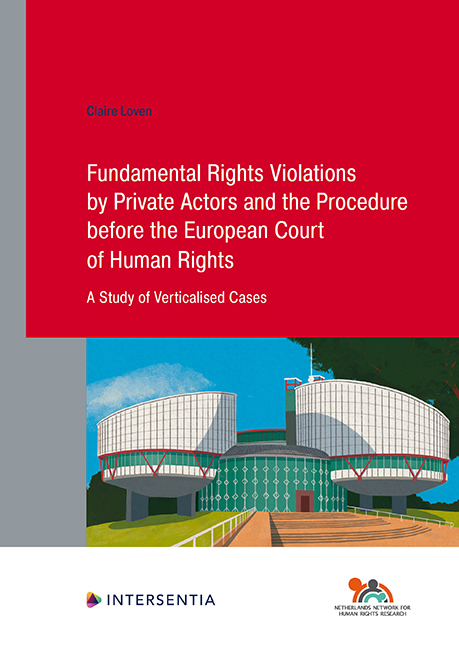 Fundamental Rights Violations by Private Actors and the Procedure before the European Court of Human Rights
Fundamental Rights Violations by Private Actors and the Procedure before the European Court of Human Rights The first part of this study explained that Article 34 ECHR stipulates that complaints about interferences with Convention rights have to be directed against a Convention State. Hence, complaints directed against private actors are incompatible ratione personae with the provisions of the Convention. This does not mean, however, that no effect is given to the Convention in horizontal relationships. Indeed, over the years the Court has increasingly offered substantive protection of Convention rights in relations between private actors. It has done so by imposing horizontal positive obligations on Convention States, requiring the latter to take action to secure the rights and liberties guaranteed in the Convention in relations between private actors. Such obligations originate from the Convention States’ responsibility for their own acts and omissions in relation to acts and omissions of private actors.
The concept of horizontal positive obligations is the focus of the first chapter (Chapter 5) in this Part II, where it is explained that through the concept of horizontal positive obligations, the Court offers substantive protection of Convention rights in relation to a broad variety of relations between private actors and Convention rights. These obligations have in common that they are often imposed in cases originating from a conflict between two private actors (i.e. a horizontal conflict) at the domestic level. In other words, even if complaints have to be directed against a Convention State to be admissible ratione personae with the provisions of the Convention, this does not yet mean that the vertical proceedings before the Court cannot originate from a horizontal conflict at the domestic level. In cases, for example, concerning the right to reputation and respect for private life versus the right to freedom of expression, an individual may have brought proceedings at a domestic court to prevent a newspaper or magazine publisher from publishing (or continuing to publish) photos of the individual's private life. Because of Article 34, and in contrast to the domestic courts, the ECtHR cannot deal directly with such behaviour by a publisher. However, the individual victim of a breach of reputation by a private actor can complain before the ECtHR about the State's lack of compliance with its positive obligations to protect the individual's rights under Article 8 ECHR. If, therefore, the domestic courts decide not to grant an injunction preventing publication of the photos, the individual can lodge an application at the ECtHR to complain about the domestic courts’ decision.
To save this book to your Kindle, first ensure [email protected] is added to your Approved Personal Document E-mail List under your Personal Document Settings on the Manage Your Content and Devices page of your Amazon account. Then enter the ‘name’ part of your Kindle email address below. Find out more about saving to your Kindle.
Note you can select to save to either the @free.kindle.com or @kindle.com variations. ‘@free.kindle.com’ emails are free but can only be saved to your device when it is connected to wi-fi. ‘@kindle.com’ emails can be delivered even when you are not connected to wi-fi, but note that service fees apply.
Find out more about the Kindle Personal Document Service.
To save content items to your account, please confirm that you agree to abide by our usage policies. If this is the first time you use this feature, you will be asked to authorise Cambridge Core to connect with your account. Find out more about saving content to Dropbox.
To save content items to your account, please confirm that you agree to abide by our usage policies. If this is the first time you use this feature, you will be asked to authorise Cambridge Core to connect with your account. Find out more about saving content to Google Drive.